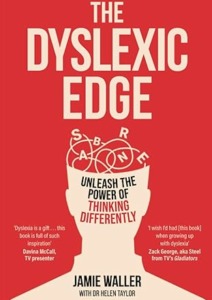In a recent episode of the Expert Insight Interview, host John Golden sat down with Jamie Waller. He is a serial entrepreneur, philanthropist, and author, to discusses the intersection of dyslexia and entrepreneurship. Jamie, known for his work with the Prince’s Trust Enterprise Network and his books “Unsexy Business” and “The Dyslexic Edge: Unleash the Power of Thinking Differently,”. It shares his journey with dyslexia and how he has turned it into a strength in his entrepreneurial endeavors. This blog post delves into the key themes and insights from their conversation. It offers actionable advice and expert recommendations for those looking to harness the power of different thinking styles in their own lives.
Jamie’s Journey with Dyslexia
Overcoming Early Challenges
Jamie Waller’s story begins in Bethnal Green, East London, where he grew up facing significant challenges, including dyslexia, ADHD, and poverty. In school, he was often labeled as “thick” or “disruptive,” leading him to leave school early without formal qualifications. Despite these obstacles, Jamie started his first business at 16 and later sold a significant business for $7.5 million at 35. It was only after this success that he felt comfortable disclosing his dyslexia, which lifted a heavy burden off his shoulders.
Realizing Dyslexia as a Strength
Initially, Jamie believed there was something inherently wrong with him due to his learning differences. However, as he gained confidence and success, he realized that many others were likely experiencing similar struggles. This realization motivated him to write his book, aiming to change the narrative surrounding dyslexia from one of deficit to one of strength.
Changing the Narrative Around Dyslexia
The Positive Aspects of Dyslexic Thinking
A pivotal moment in Jamie’s journey was a conversation with Richard Branson, a well-known dyslexic entrepreneur. They discussed the common portrayal of dyslexia as a disadvantage, which led Jamie to research the positive aspects of dyslexic thinking. He discovered that a significant percentage of self-made millionaires and entrepreneurs are dyslexic, highlighting the potential strengths associated with this learning difference.
Collaboration with Dr. Helen Taylor
To ensure that the narrative in his book was grounded in research, Jamie collaborated with Dr. Helen Taylor, an academic specializing in dyslexia. They concluded that dyslexia is often a label for individuals who learn differently, rather than a true disability. Jamie argues that society has created a learning system that favors a specific type of learner, leaving those who think differently at a disadvantage.
Explorers vs. Exploiters
Jamie categorizes people into two groups: explorers and exploiters. Explorers, who make up about 15% of the population, are characterized by their innovative thinking and resilience. In contrast, exploiters, who represent the remaining 85%, are more adept at utilizing existing knowledge. Jamie believes that the traits associated with exploration—such as creativity, problem-solving, and resilience—are essential for entrepreneurship and sales.
Resilience and the Explorer Mindset
Developing Resilience
Dyslexic thinkers often develop a strong sense of resilience due to their experiences growing up. They learn to cope with rejection and failure, which are common in both entrepreneurship and sales. This resilience is a crucial trait that enables them to navigate the challenges of starting and running a business.
Anecdotes of Success
Throughout the episode, Jamie shares anecdotes from his own life and the lives of other successful dyslexic entrepreneurs. He notes that many dyslexic thinkers possess a deep sense of injustice, which drives them to create solutions and make a positive impact in their communities. This sense of purpose often translates into successful business ventures, as they seek to address problems they have personally encountered.
The Importance of Human Connection in Business
Verbal Communication and Storytelling
Jamie and John discuss the importance of human connection in entrepreneurship and sales. Dyslexic thinkers often excel in verbal communication and storytelling, which are vital skills in building relationships and closing deals. Jamie contrasts this with the modern tendency to rely on technology and impersonal communication methods, such as emails and automated messages.
Building Relationships
Jamie shares a personal story about how he built a relationship with a key decision-maker over 14 months, emphasizing the value of persistence and face-to-face interaction. He argues that the ability to connect with people on a personal level is becoming increasingly rare but is essential for long-term success in business.
Empowering Dyslexic Thinkers
Supporting Marginalized Individuals
Jamie emphasizes the importance of providing support and opportunities for individuals with dyslexia, particularly those who have been marginalized or struggled throughout their lives. He shares his work with the Prince’s Trust in the UK, where he has established a department focused on helping prisoners reintegrate into society. By teaching them how to set up their own market stalls, shops, or other small businesses. Jamie aims to empower these individuals and provide them with the tools they need to succeed upon their release.
Entrepreneurship as a Viable Option
Jamie explains that starting a business can be a viable and accessible option for those who have been incarcerated. He expresses a desire to reach dyslexic thinkers before they end up in prison, but acknowledges that if they can make a positive impact while the individuals are incarcerated, that is still a significant achievement.
Conclusion: A Call to Action
In closing, Jamie reiterates the need to change the perception of dyslexia in society. By highlighting the strengths associated with dyslexic thinking. Individuals can be encouraged to embrace their unique learning styles and pursue entrepreneurship. Jamie’s book aims to provide insights not only for those with dyslexia. Also for anyone looking to harness the power of different thinking styles in their own lives.
This episode serves as an inspiring reminder that challenges can be transformed into strengths and that embracing diversity in thought can lead to innovation and success in business. Jamie Waller’s journey exemplifies the potential of dyslexic thinkers to thrive in entrepreneurship. His insights offer valuable lessons for anyone seeking to navigate the complexities of the business world.
Key Takeaways
- Embrace Different Thinking Styles: Dyslexia and other learning differences can be strengths in entrepreneurship.
- Develop Resilience: Overcoming challenges can build resilience, a crucial trait for business success.
- Value Human Connection: Personal relationships and verbal communication are essential in business.
- Support Marginalized Individuals: Providing opportunities and education can empower those who have faced adversity.
For more insights, be sure to check out Jamie Waller’s books, “Unsexy Business” and “The Dyslexic Edge: Unleash the Power of Thinking Differently,” and stay tuned for future episodes of the Expert Insight Interview.
Our Host
John is the Amazon bestselling author of Winning the Battle for Sales: Lessons on Closing Every Deal from the World’s Greatest Military Victories and Social Upheaval: How to Win at Social Selling. A globally acknowledged Sales & Marketing thought leader, speaker, and strategist, he has conducted over 1500 video interviews of thought leaders for Sales POP! online sales magazine & YouTube Channel and for audio podcast channels where Sales POP! is rated in the top 2% of most popular shows out of 3,320,580 podcasts globally, ranked by Listen Score. He is CSMO at Pipeliner CRM. In his spare time, John is an avid Martial Artist.









Comments